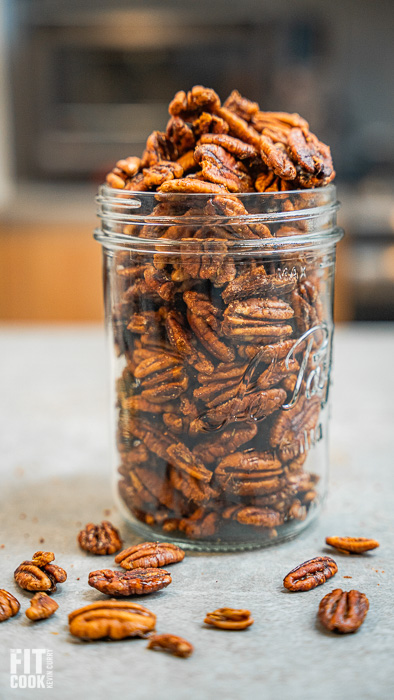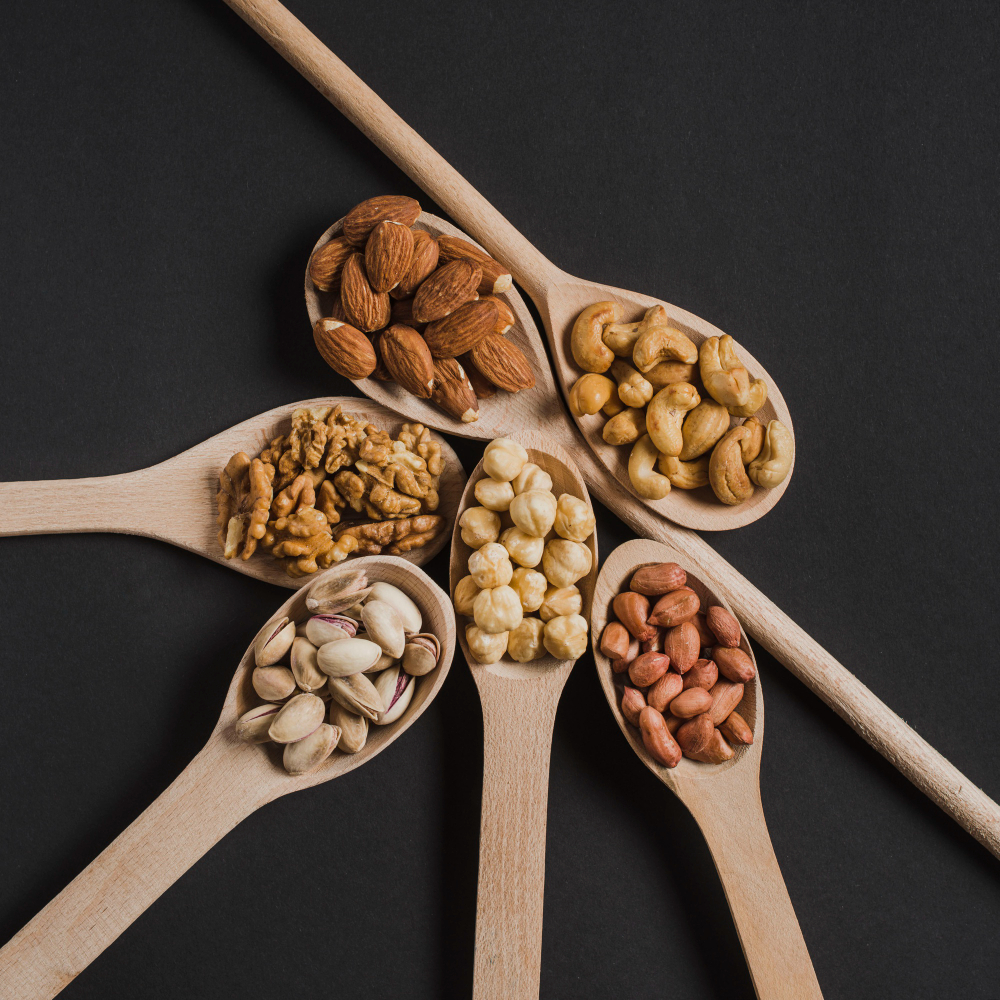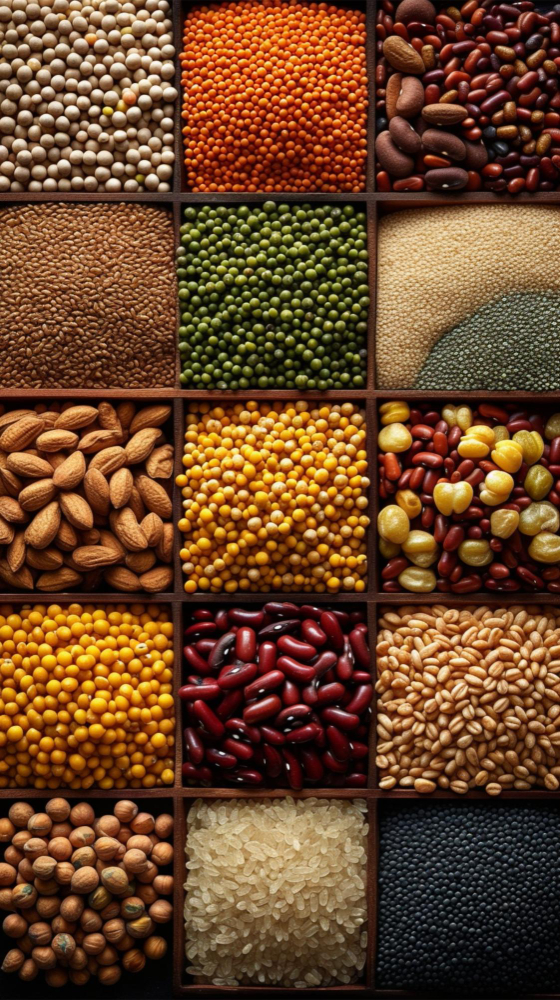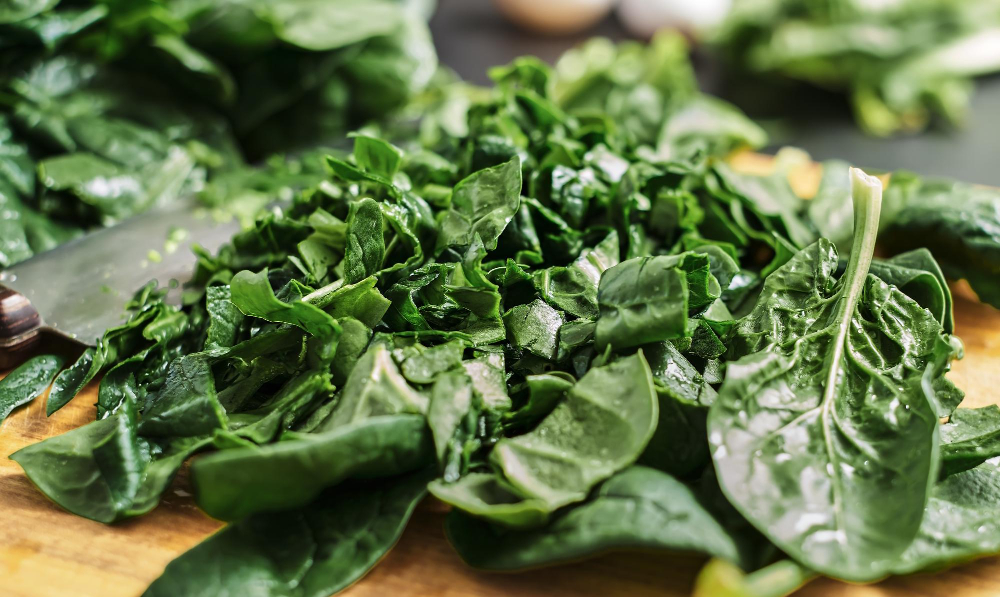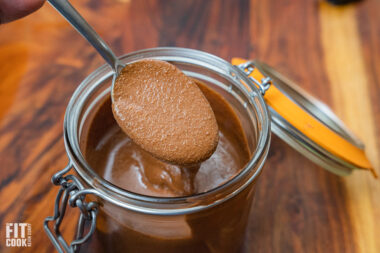How to Dehydrate Nuts
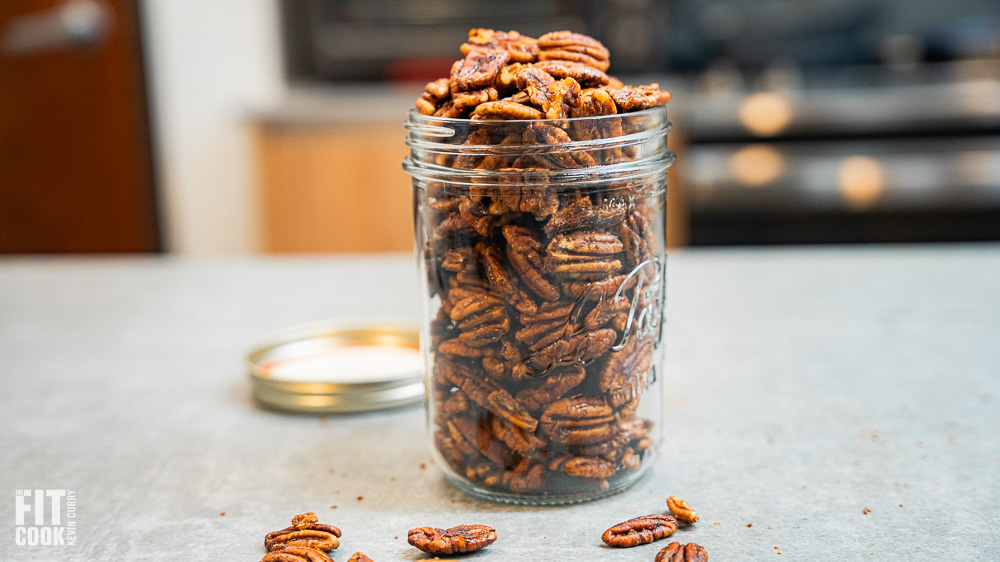
Want to save this recipe?
I got you! Just enter your email address, and I'll forward it to your inbox! Plus, you'll receive a bonus of healthful, "must-try" recipes each week!
Have you ever snacked on your favorite nuts like almonds, cashews, or pecans and felt bloated afterward?
You’re not alone! I feel like I’m the “president” of that club! It wasn’t until about one month ago that I stumbled upon – what I didn’t know would be – a partial cure (at least for me).
Dehydrating nuts!
I’ve dehydrated fruits and meats as part of my weekly meal prep snacks. But I never considered or knew I should have been dehydrating nuts alongside them to solve the bloating issue after I eat nuts!
Fair warning—this may be a bit more technical than most recipe write-ups. However, I think it’s important that we understand the science (the why) behind our daily decisions that impact our overall health.
Does dehydrating nuts reduce the nutritional value?
Yes…but also, not necessarily.
Dehydrating nuts can lead to some nutrient loss, particularly nutrients that are heat-sensitive like certain water-soluble vitamins like C and B due to exposure to heat and air, as well as enzymes. Additionally, some enzymes that aid in digestion may also be destroyed by heat.
However, the extent of nutrient loss depends on the dehydration method, temperature, and the duration of dehydration.
On the flip side, while there may be some loss of heat-sensitive nutrients, dehydrating nuts can alternatively concentrate certain nutrients, such as minerals and healthy fats, as the water content decreases.
Opting for lower temperatures and shorter duration dehydration methods, such as using a food dehydrator set at a lower temperature, can help minimize nutrient loss. Additionally, consuming a variety of nuts, as well as incorporating other nutrient-rich foods into your diet, can help offset any potential nutrient loss from dehydrated nuts.
Benefits of dehydrating nuts
Dehydrating nuts can offer several benefits, chief among them (for me) making them more easily digestible:
- Removes Moisture: Dehydrating removes excess moisture, leading to a longer shelf life, preventing mold, and making nuts easier to store. This process also concentrates the flavors and nutrients in the nuts.
- Reduces Anti-Nutrients: Nuts naturally contain compounds like phytic acid and enzyme inhibitors (more on this below), which can slow or even block nutrient absorption and cause digestive discomfort for some people. Dehydrating helps break down these anti-nutrients, making the nutrients in the nuts more readily absorbable (more on anti-nutrients below).
- Improved Digestion: Removing moisture and breaking down anti-nutrients can make nuts easier to digest for folks like me, reducing the likelihood of bloating or gas (which is not uncommon).
- Intensified Flavor and Texture: Dehydrating nuts can intensify their flavor and give them a crunchier texture, making them more enjoyable to eat as snacks or added to dishes. No, seriously – they are crispy like crackers!
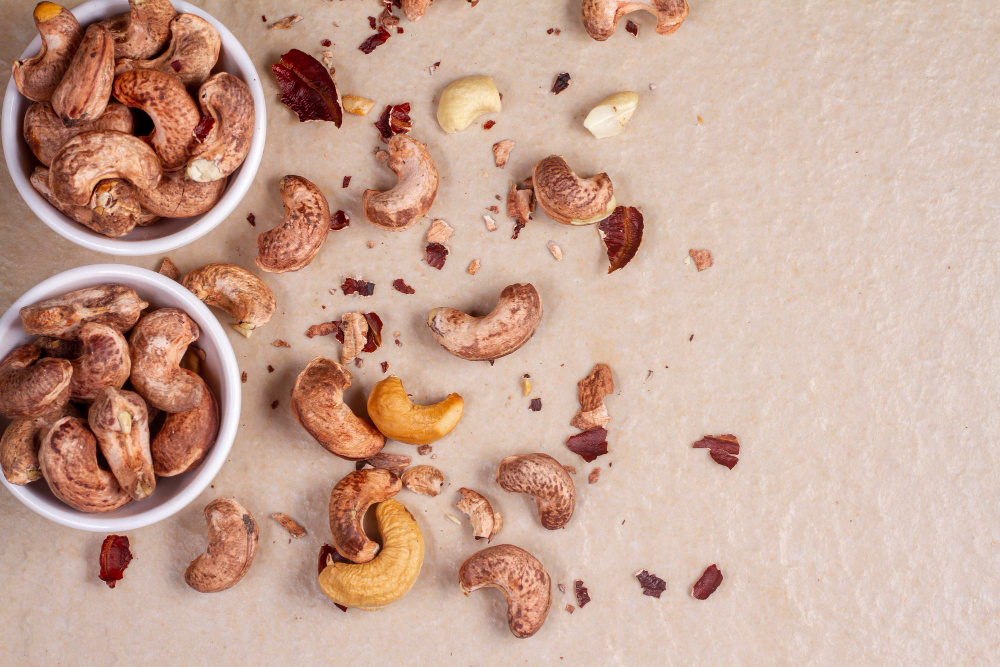
What is an anti-nutrient?
An anti-nutrient is a compound in some foods that can interfere with nutrient absorption or adversely affect one’s health.
Lemme explain it like this – we eat food for nourishment and the vitamins and minerals they provide us, right? These darn anti-nutrients “frustrate” that, making it challenging to get the most nutrients from certain foods.
Some common examples of anti-nutrients include:
- Phytic Acid: Found in grains, nuts, seeds, and legumes, phytic acid can bind to minerals like zinc, calcium, and iron, reducing their absorption in the body.
- Lectins: Proteins found in grains, legumes, and nightshade vegetables (ie, tomatoes, eggplant, and potato). Lectins may interfere with nutrient absorption and cause inflammation in the gut.
- Oxalates: found in foods like spinach, beet greens, and nuts. Oxalates can bind to calcium and form crystals, potentially leading to kidney stones and inhibiting calcium absorption.
- Tannins: Found in tea, coffee, wine, and certain fruits, tannins can inhibit iron absorption and other minerals.
What is an enzyme inhibitor?
Enzyme inhibitors are substances that can interfere with the action of digestive enzymes, which are necessary to help break down nutrients in the digestive tract. Let’s call these the “haters” since they’re constantly trying to block and thwart the digestive process.
While enzyme inhibitors may not directly cause bloating, they CAN contribute to digestive discomfort by hindering the digestion of proteins, fats, and carbohydrates.
As a result, undigested food may reach the colon, where it can ferment and produce gas, leading to bloating, gas, and abdominal discomfort for some….(whispers, “…some like me.”)
Does phytic acid in nuts cause bloating?
YES, it can! That’s why I’m writing this.
When we eat foods that have phytic acid, the compounds can attach themselves to healthful minerals like zinc, iron, and calcium in our digestive system.
Remember, our bodies need minerals for various functions, such as forming healthy bones and supporting our immune system. So when phytic acid attaches to these minerals, it forms compounds called phytates, which our bodies cannot absorb well.
As a result, we may get less of these healthful minerals from the foods we eat. Even more, phytic acid and phytates can make it harder for our bodies to digest food’s proteins, fats, and carbohydrates.
Undigested food particles can reach the colon, where bacteria can ferment them. This fermentation process can produce gas, leading to bloating, discomfort, and even diarrhea for some.
Does dehydration reduce the impact of phytic acids in foods?
Not entirely.
Dehydration (or dry roasting) alone does not significantly reduce the presence of phytic acids in foods.
However, combined with other methods, phytic acid levels in food can be reduced, making the minerals they contain more readily available.
These methods include soaking, sprouting, fermenting, and cooking.
- Soaking: Soaking nuts, seeds, grains, and legumes in water for a period of time can help reduce phytic acid levels.
- Sprouting: Sprouting involves allowing seeds, grains, or legumes to germinate, which can decrease phytic acid levels as the seeds prepare for growth.
- Fermenting: Fermentation is when bacteria or yeast break down carbohydrates and produce organic acids. This process can reduce phytic acid levels in grains and legumes.
- High-Temp Cooking: Cooking food at high temperatures can also help reduce phytic acid levels to some extent.
How to dehydrate nuts for gut health
Soak the nuts in (distilled) water for 8 hours or up to 24 hours. I prefer soaking them the full 24 hours. I find the end result after dehydrating is much crispier as well.
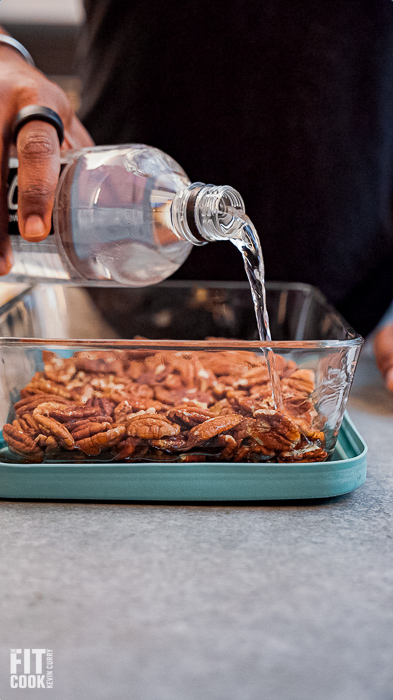
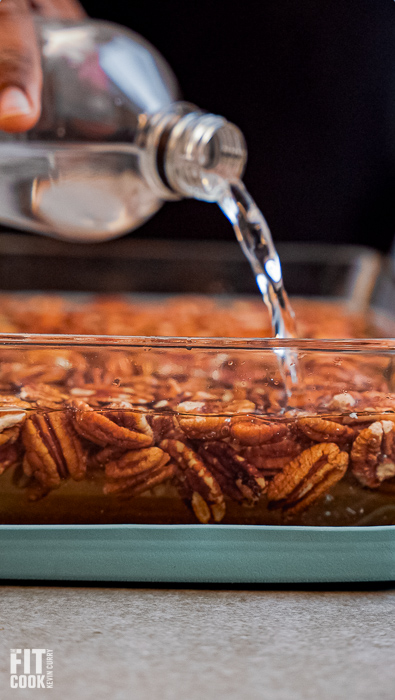
Cover and soak at room temperature for about 6 hours or in the fridge for a full 24 hours.
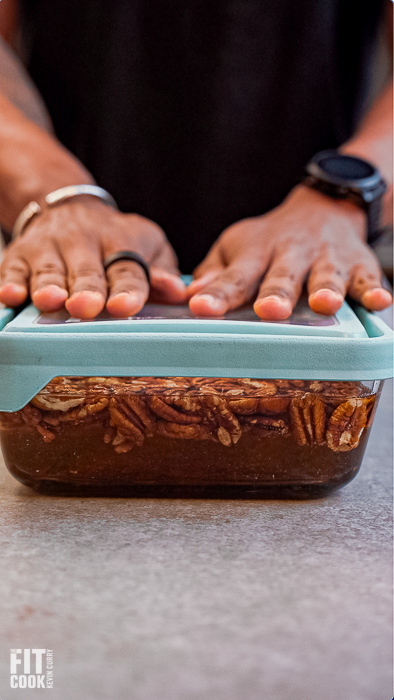
Drain and rinse the nuts. Add them to a mixing bowl.
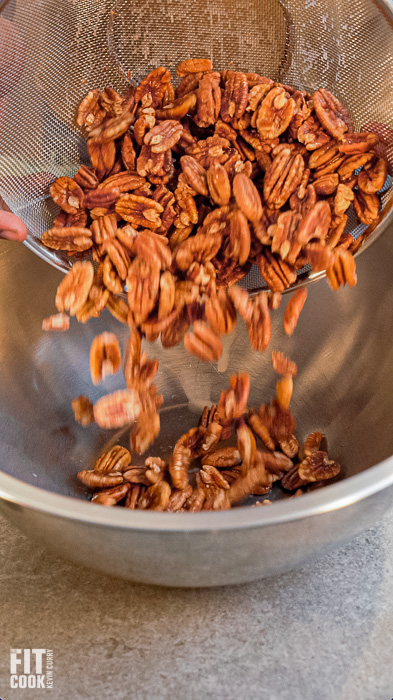
Sprinkle in any spices, and toss the nuts in the spices. NO oil is necessary.
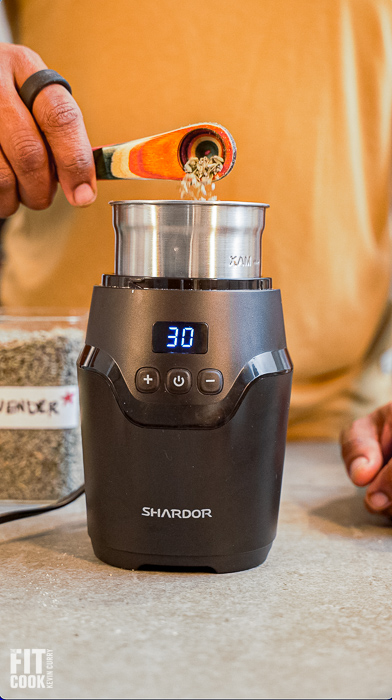
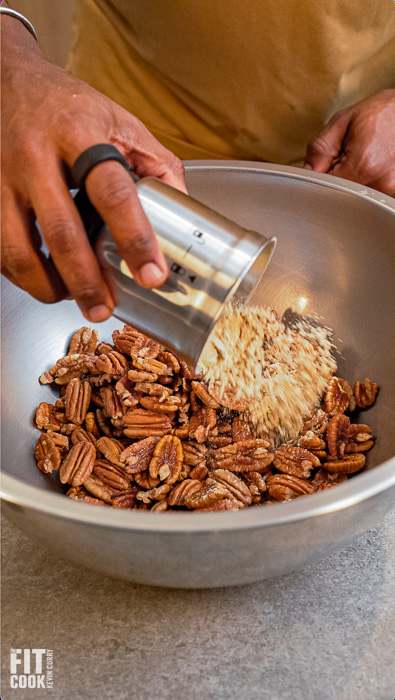
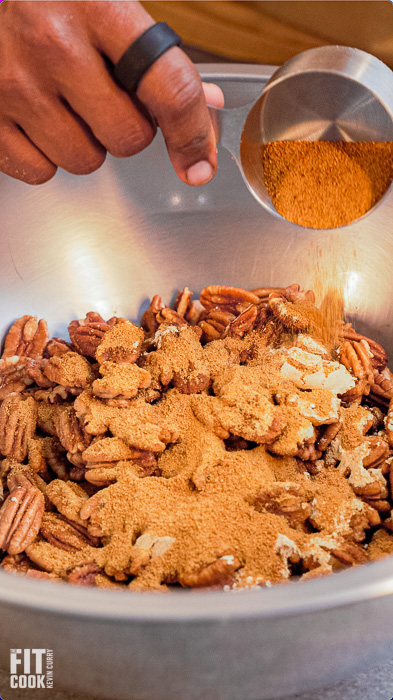
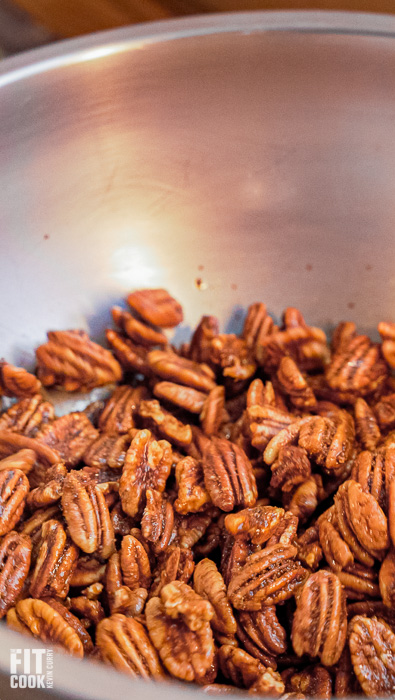
Set your dehydrator between 135F – 150F. But I recommend 137-138F to be safe.
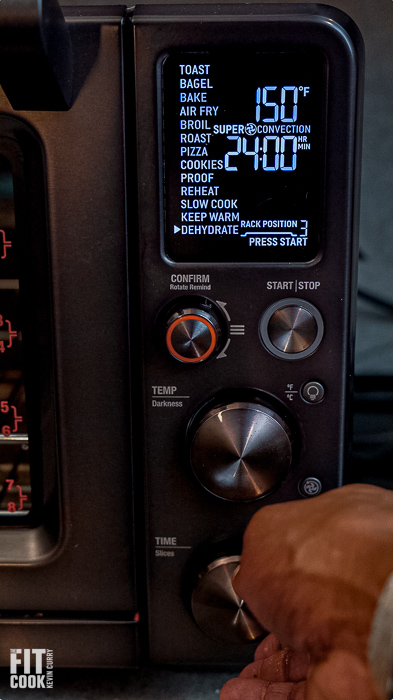
Spread the nuts on the dehydrator tray and be sure the tray is not crowded.
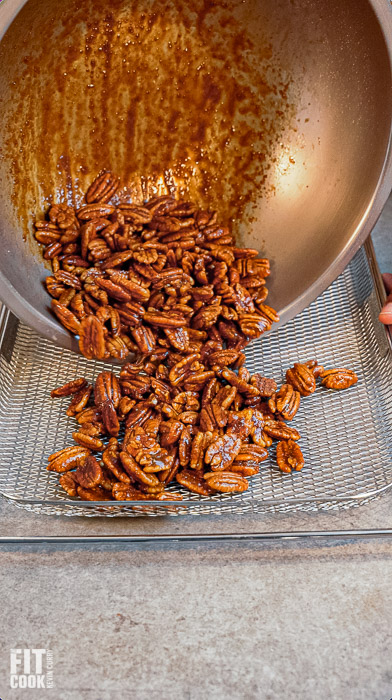
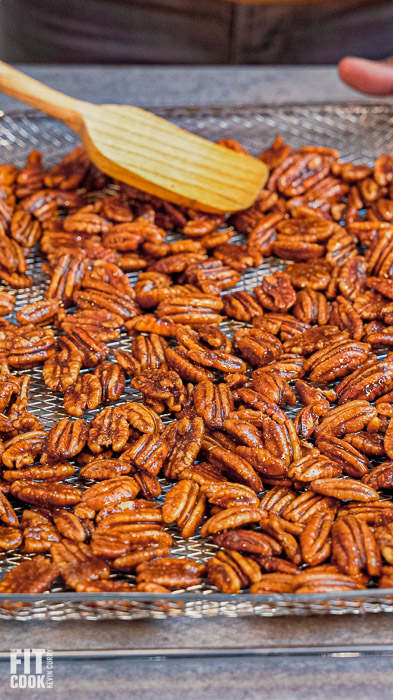
Dehydrate for at least 24 hours (or longer if needed because they are still chewy). If desired, flip/shake the nuts with a spatula every 8 hours.
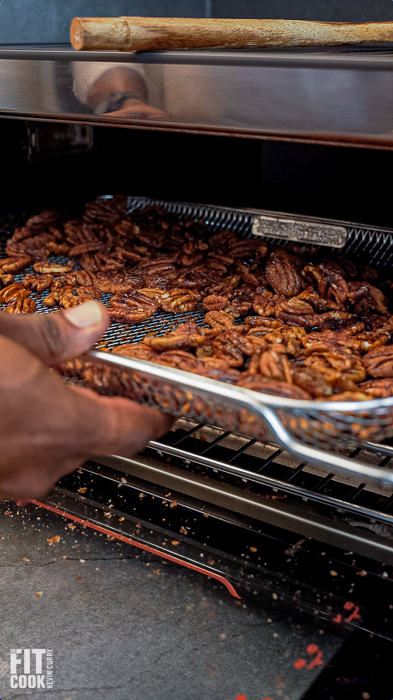
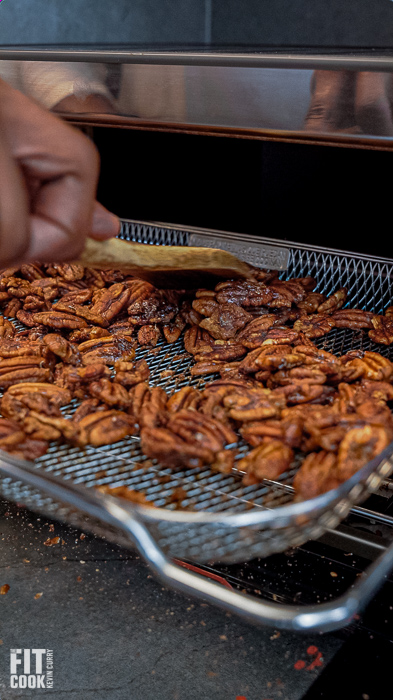
Once finished, remove the nuts from the dehydrator and let them come to room temp about 10 minutes. 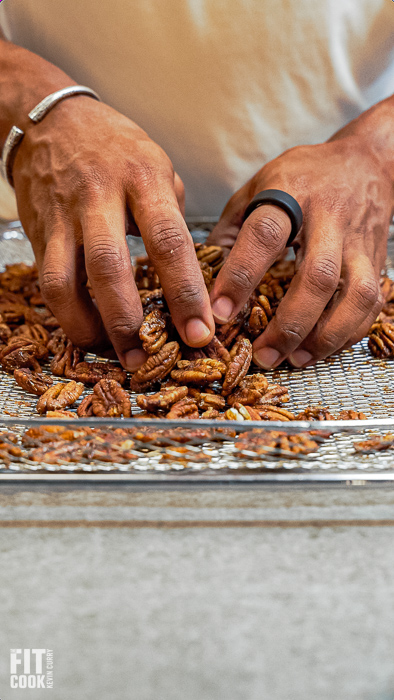
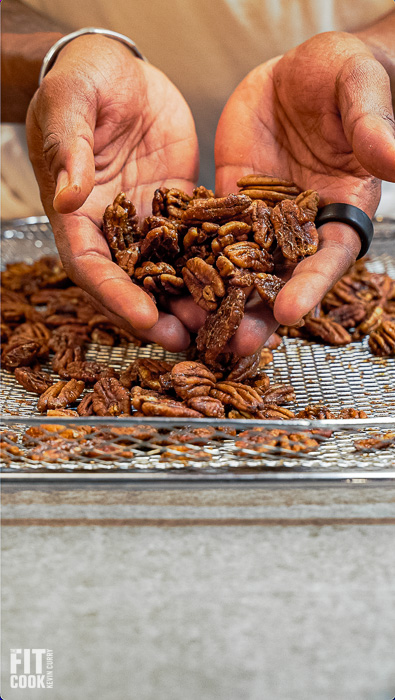
Store in an airtight container once they are no longer hot to preserve freshness and crispiness.
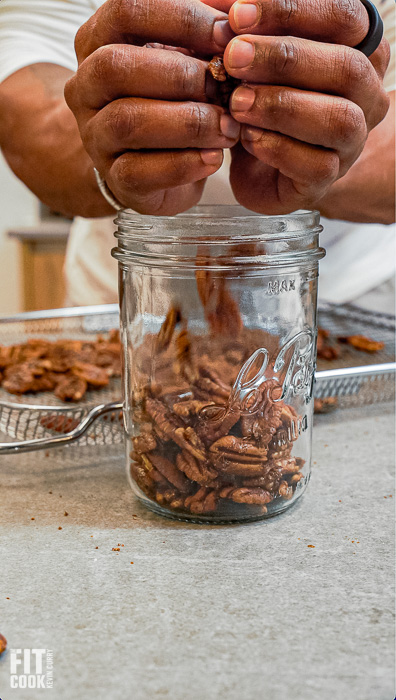
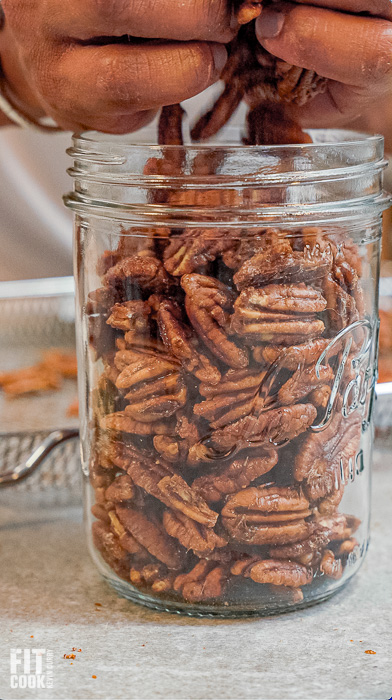
Note: Do NOT add them to a container if they are still hot. They should be room temp.
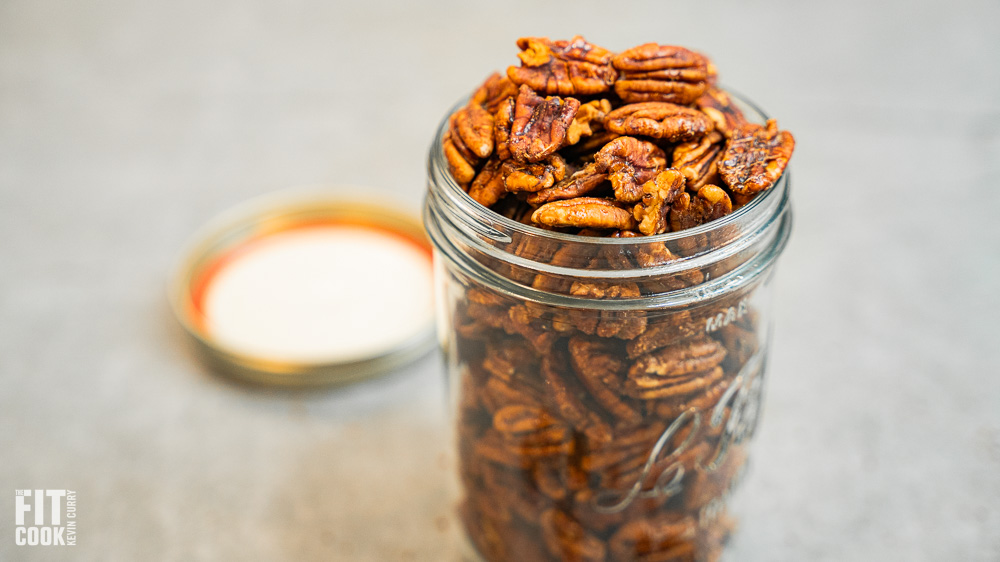
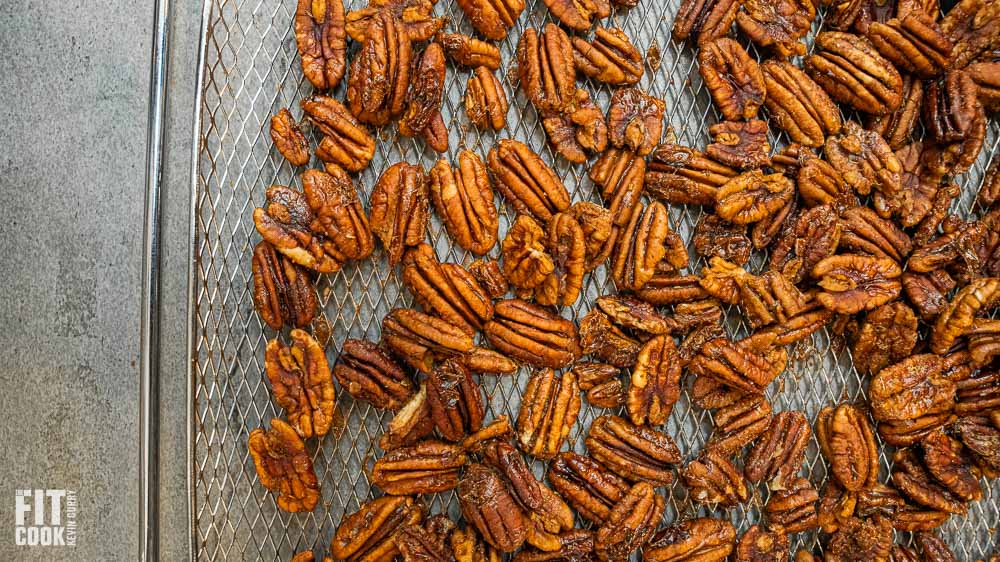
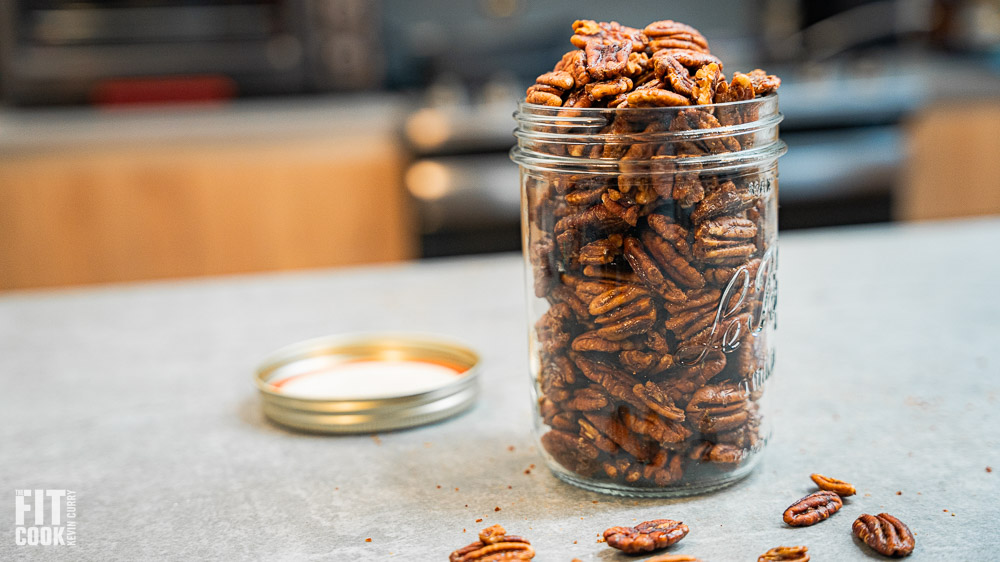
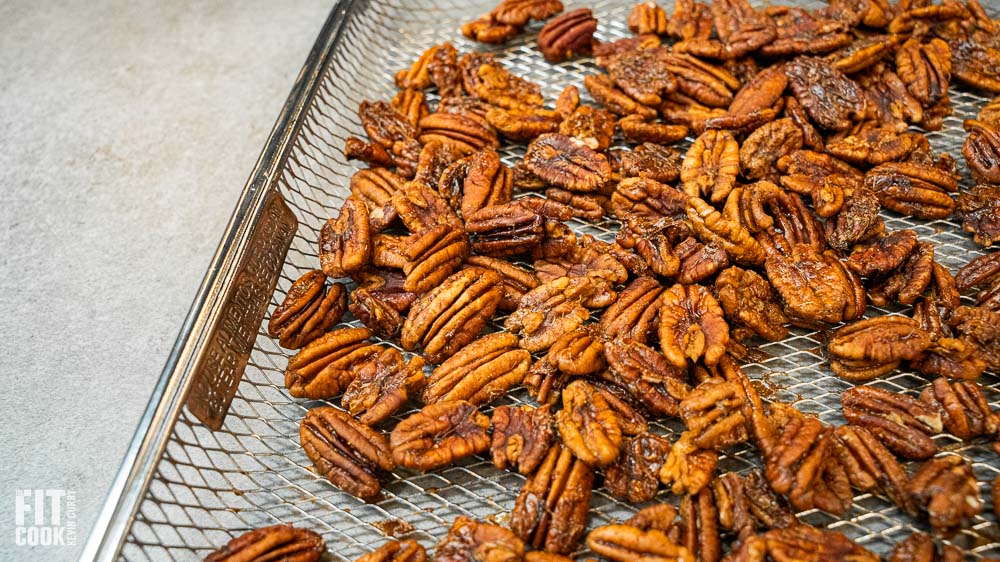
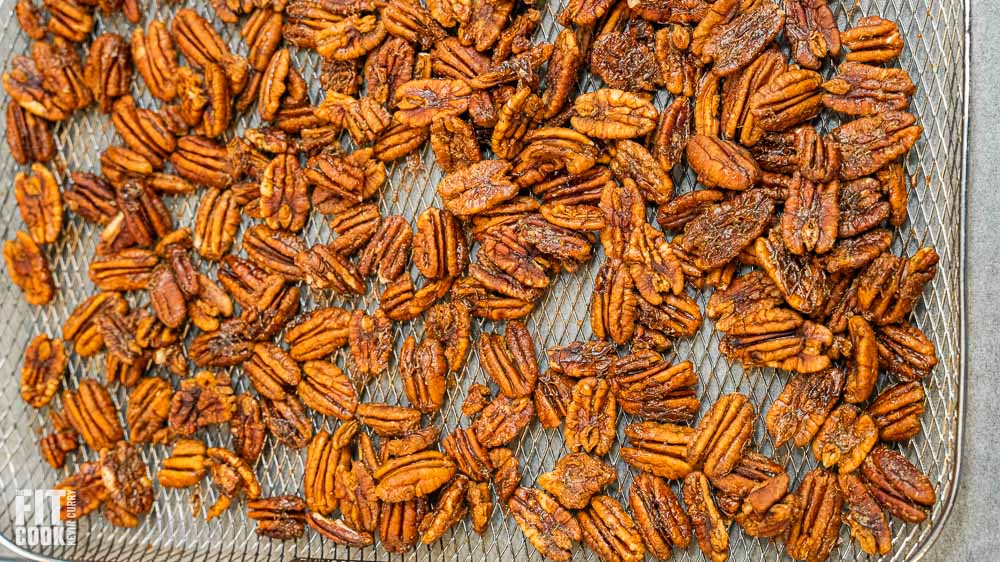
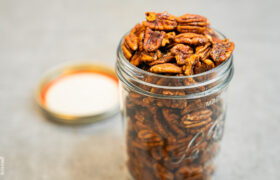
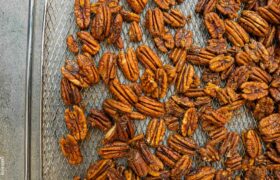
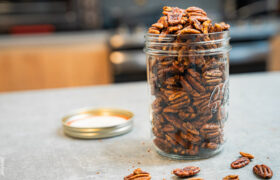
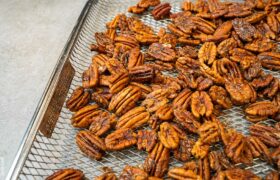
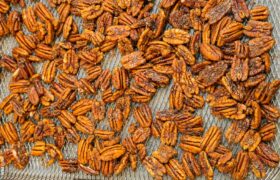
How to Dehydrate Nuts
Ingredients
- 4 cups raw pecans (or nuts of your choice)
-
2 cups coconut sugar
raw cane sugar
- 2 tablespoons kosher salt
- 2 teaspoons smoked paprika
- 1 tablespoon cinnamon
Steps
Step 1
Add pecans to a bowl or container and add enough water to cover the top of the pecans. Cover and soak for 4 – 6 hours at room temperature, or soak in the fridge for up to 24 hours.
Step 2
Drain the water from the pecans and rinse off any residue. I suggest using a colander.
Step 3
Set the dehydrator or oven to 137F.
Add the pecans to a large mixing bowl. Separately, mix all the sugar and spices in a small bowl or cup.
Sprinkle the spices over the pecans and toss (or stir with a spatula) to ensure every pecan is coated with spices.
Step 4
Spread out the pecans or nuts in the dehydrator basket or tray and as much as possible, try not to have them touch. Give them as much space as possible.
Step 5
Add to the dehydrator and process for at least 24 hours. I like to check on the nuts every 8 hours to ensure they are evenly dehydrating. I use a spatula to mix and flip the nuts, which I find makes them extra crunchy in the end.
Step 6
At the 24-hour mark, remove one or two nuts from the tray and let them slightly cool. If the nut is chewy or is not crunchy, continue dehydrating for another hour, and repeat until you get the desired result.
Remove all the nuts from the dehydrator and allow them to cool to room temperature.
Step 7
Store in an airtight container. The nuts should last for several months; however, I doubt they’ll last 2 weeks – they are THAT delicious.
How to Dehydrate Nuts
Kevin Curry
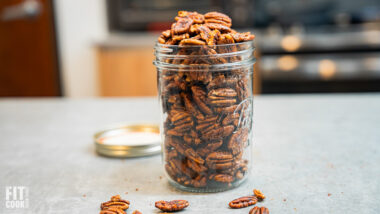
- 4 cups raw pecans (or nuts of your choice)
-
2 cups coconut sugar
raw cane sugar
- 2 tablespoons kosher salt
- 2 teaspoons smoked paprika
- 1 tablespoon cinnamon
-
Add pecans to a bowl or container and add enough water to cover the top of the pecans. Cover and soak for 4 – 6 hours at room temperature, or soak in the fridge for up to 24 hours.
-
Drain the water from the pecans and rinse off any residue. I suggest using a colander.
-
Set the dehydrator or oven to 137F.
Add the pecans to a large mixing bowl. Separately, mix all the sugar and spices in a small bowl or cup.
Sprinkle the spices over the pecans and toss (or stir with a spatula) to ensure every pecan is coated with spices.
-
Spread out the pecans or nuts in the dehydrator basket or tray and as much as possible, try not to have them touch. Give them as much space as possible.
-
Add to the dehydrator and process for at least 24 hours. I like to check on the nuts every 8 hours to ensure they are evenly dehydrating. I use a spatula to mix and flip the nuts, which I find makes them extra crunchy in the end.
-
At the 24-hour mark, remove one or two nuts from the tray and let them slightly cool. If the nut is chewy or is not crunchy, continue dehydrating for another hour, and repeat until you get the desired result.
Remove all the nuts from the dehydrator and allow them to cool to room temperature.
-
Store in an airtight container. The nuts should last for several months; however, I doubt they’ll last 2 weeks – they are THAT delicious.
Nutrition per serving
Popular Content
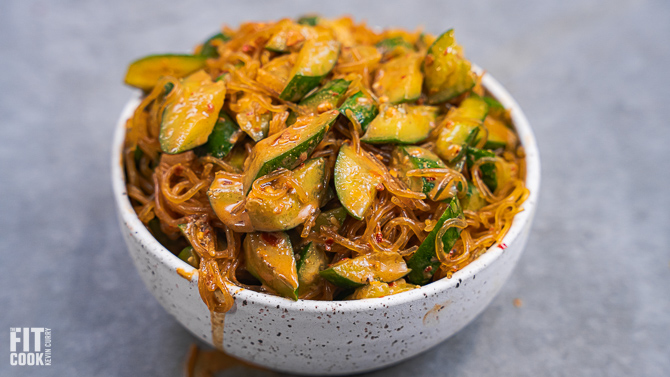
Low Carb Peanut Kelp Noodle Salad
Let me introduce you to one of my favorite low-carb yet filling meal prep recipes...
April 25, 2024
ABOUT THE AUTHOR
Hey, I'm Kevin
My name is Kevin. My life changed when I realized that healthy living is a lifelong journey, mainly won by having a well-balanced diet and maintaining an active lifestyle.
By experimenting in the kitchen and sharing my meals on Tumblr, I learned healthy eating is not boring! By making a few adjustments to my favorite foods, I could design a diet that could help me achieve my wellness goals while satisfying my desire for BANGIN food! 😅 Now I try to help people around the world realize that same level of freedom in eating regardless of budget. Welcome, let's #DemocratizeWellness together!
